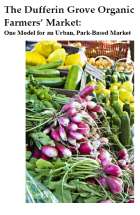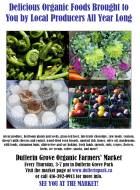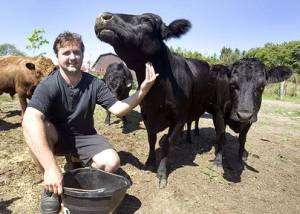
Pages in this Folder:

Related Folders:
See also Department Site Map
Publications:
Market-related videos
Comments?
For the basics, see
- Website & Privacy Policies
- How To Get Involved
- The Role of the Park
Search options:
Department Site Map
Custodians:
posted on September 06, 2008
The Star: Small cows have a big future in Ontario
`The small cow with a big future' is gaining ground in Ontario
By: Francine Kopun
Published: September 06, 2008
Source: The Star
FRED THORNHILL FOR THE TORONTO STAR
Grant Comissiong with his herd, in Rosemeath.
"My wife named them all. They're all named after spices."Have a cow. Seriously.
Not a humongous, lumbering soft-eyed hay-eater. Those are for cattle ranchers.
The cow for you is petite, the height of a big dog, survives on grass and bushes and produces high-quality milk or meat. A mini-cow.
At 700 pounds, they remain unsuitable for condo balconies or even the average backyard, but mini-cows like the Dexter, growing in popularity in North America, can live happily on half a hectare or less.
"My cows are the talk of the neighbourhood because they are small and they live on weeds," says Charlotte Gushue of Charlotte's Web Farm in Millbrook.
The Dexter is a cow whose time has come, enthusiasts say. They keep your lawn cropped, and produce food, making them energy efficient. And if you keep your own cow, you know it's not hopped up on hormones or stuffed with chemicals.
"One of our slogans is, `The small cow with a big future.' It's the perfect cow for an acreage outside of town," says Graham Dalziel, a director of the Canadian Dexter Cattle Association and owner of Riverlot Dexters in Smoky Lake, Alta., northeast of Edmonton.
Tom Henry, the editor of Small Farm Canada magazine, says small breeds are here to stay. The physical size of these breeds suits a lot of small farmers, he says. They are easier animals to handle and they yield more manageable amounts of meat.
"All that said, I think they're enjoying a little bit of a renaissance now, which mean that they will probably enjoy a non-renaissance somewhere a few years down the road."
Dexters originated in Ireland, according to Dalziel's organization. Originally kept by small landholders, they were known as the "poor man's cow." The average Dexter cow can produce eight or more litres of milk per day and survive just about anywhere. They calve easily, without the expensive intervention of a veterinarian. And they're user friendly.
"I'm only 4-foot-10, and I'm not intimidated by the size of them," says Ellen Riopelle, of Sandy Hill Farm, near Pembroke. She has been raising Dexters for about four years.
Other mini-moos include Miniature Herefords, a smaller version of the popular white-faced full-size Hereford, and Lowlines, a half-size black breed developed from purebred Angus cattle.
A single cattle ranch in Alberta may have as many as 4,000 head of cattle. Meanwhile, the number of mini-cows in Canada – including Dexters, miniature Herefords and Lowlines – is in the low thousands.
Mini-cows are the ideal animal for people worried about a global warming apocalypse. Or for people with concerns about the food chain. Or for people who think they're cute.
Grant Comissiong grew up in downtown Toronto, but moved out to Roseneath to take over the old family farm in 1999. He and his wife bought six Dexters. This fall will be the first time they take any to slaughter. Comissiong isn't sure how he's going to feel about that.
"My wife named them all. They're all named after spices."
Glorianne Bjerland, president of the Dexter cattle association, keeps 13 Dexters on her Saskatchewan farm and works as a nurse manager at a home-care. The cattle are easier, she says.
"We're starting to get more calls and word-of-mouth. Now, with this Maple Leaf scare, maybe people will think again about having a safe food source. We've got people coming tomorrow. They're a family and they want a milk cow. Usually, it's people who are concerned about where their food is coming from."
Urban dreamers take note: The Toronto Municipal Code, Chapter 349, lists bovines as a prohibited species, says Fiona Venedamtheyre, supervisor of Toronto Animal Services, north region. Unless your property is zoned agricultural – and in the northern reaches of Toronto and a few properties in the old Scarborough, there's a slim chance it might be.
If your land qualifies, you might want to look into the mini-cow thing. You know, for the apocalypse.
|
Read more News. | ||





 Printer friendly version
Printer friendly version
